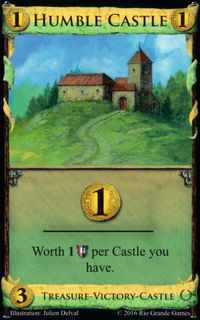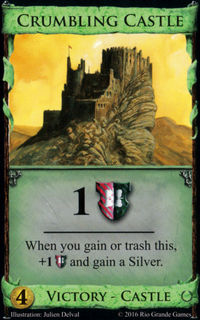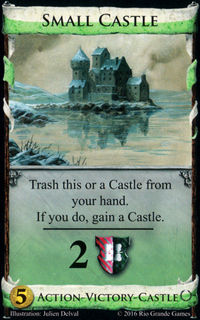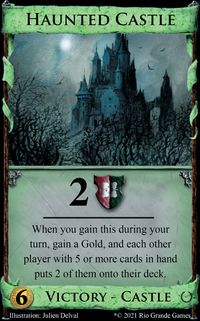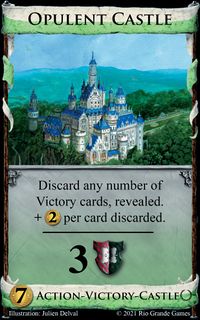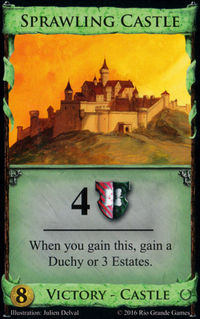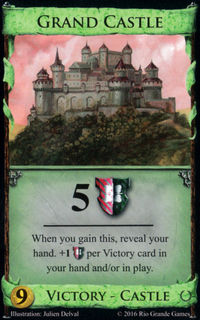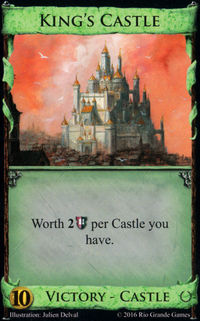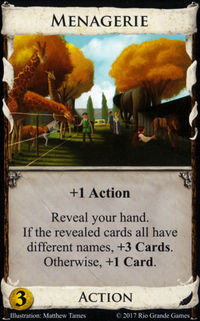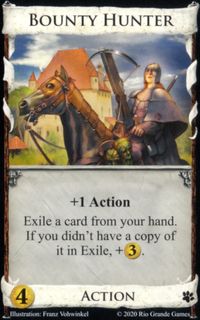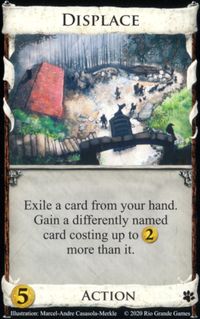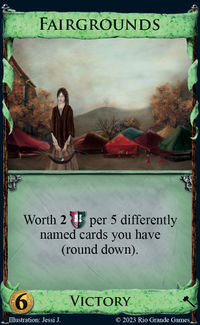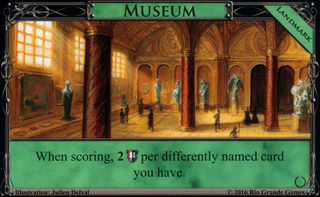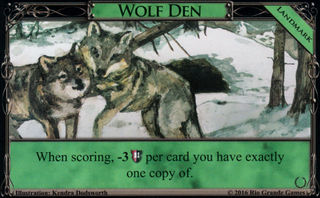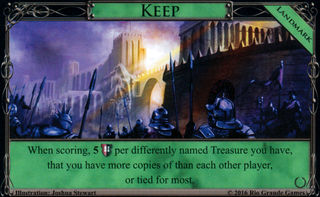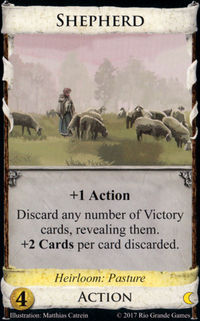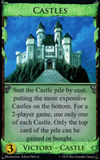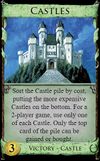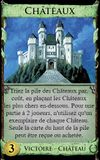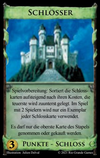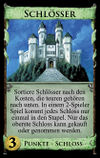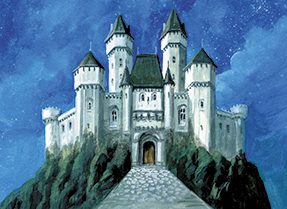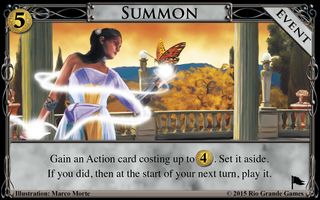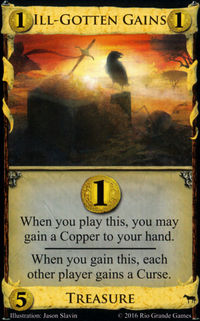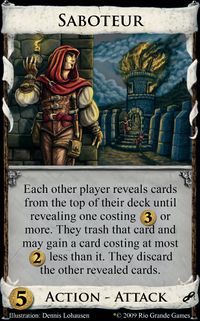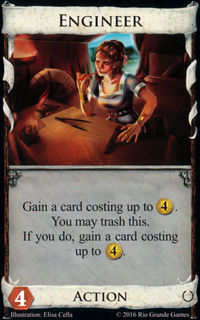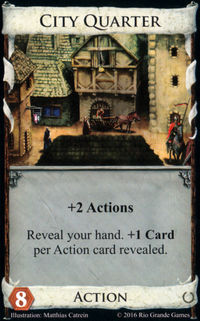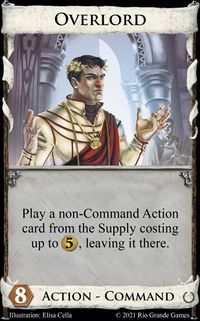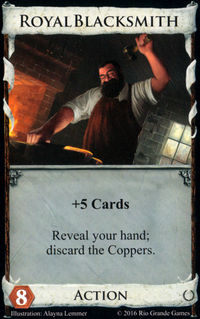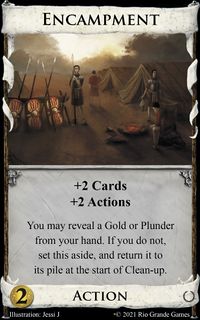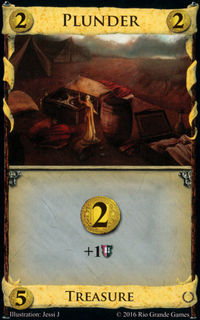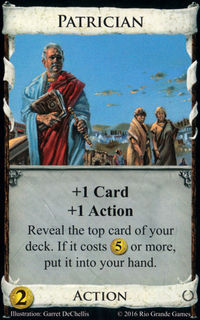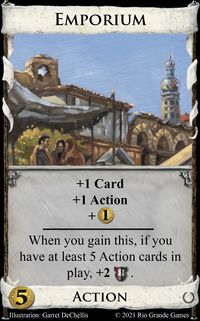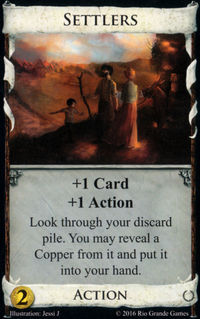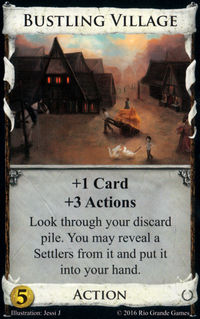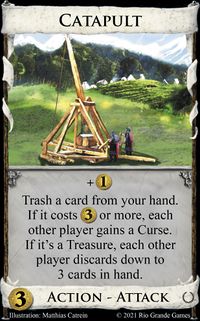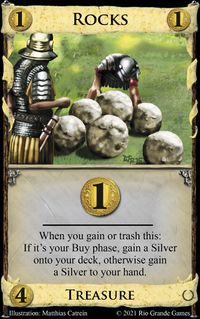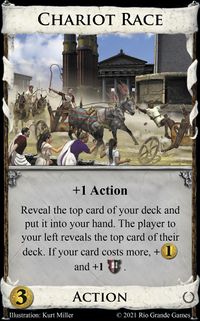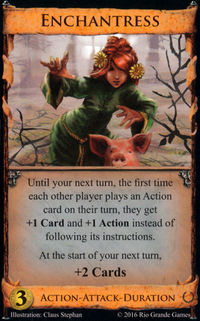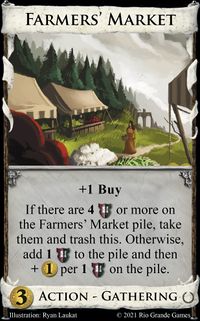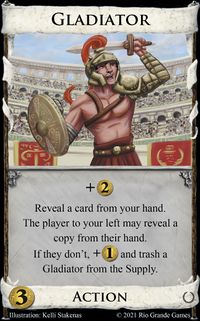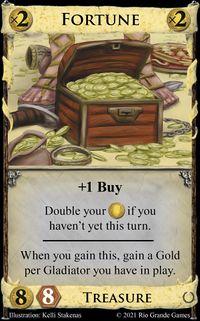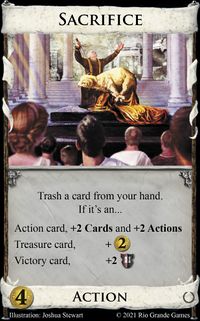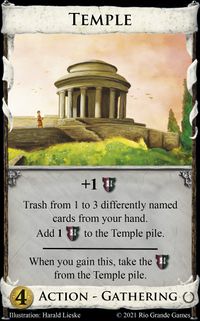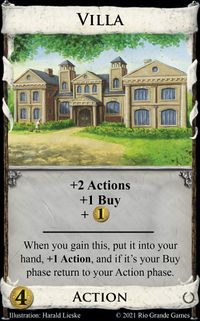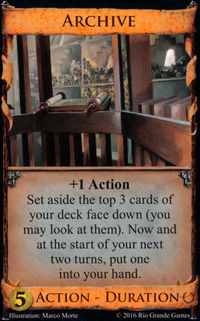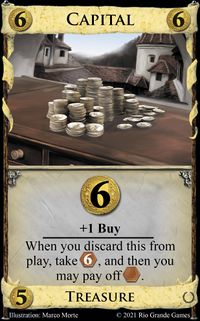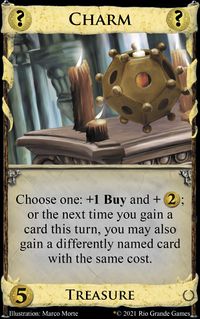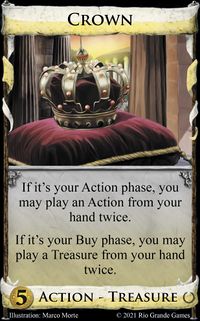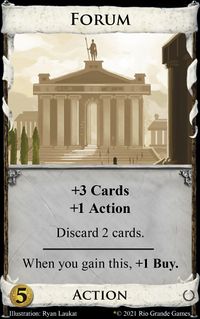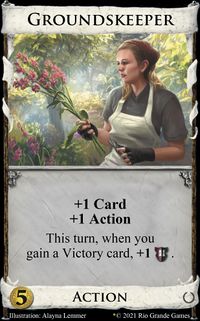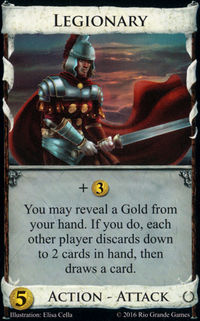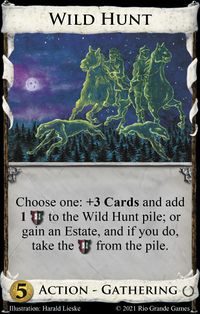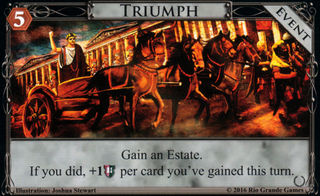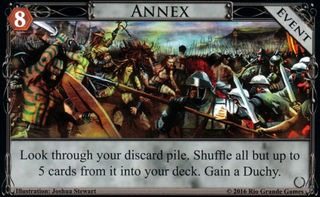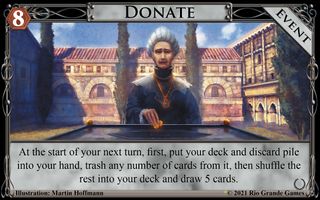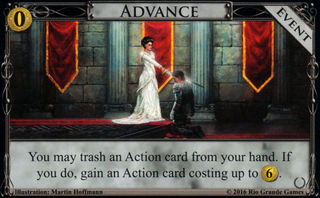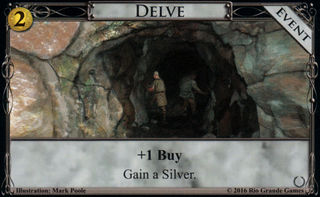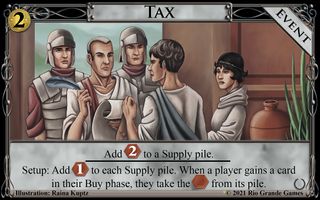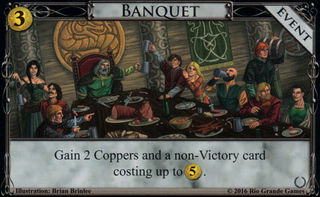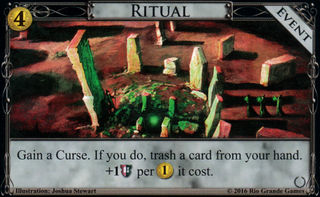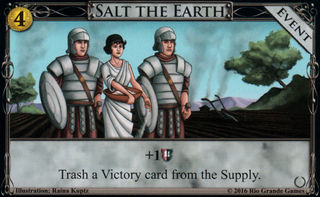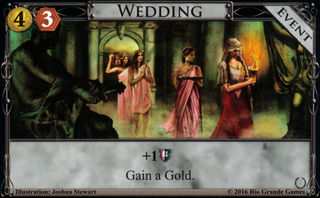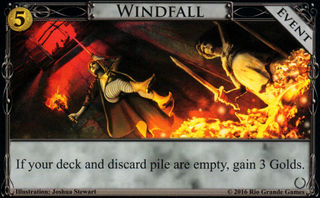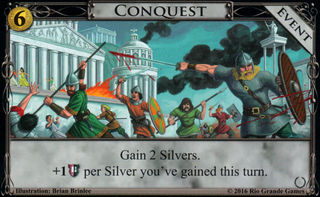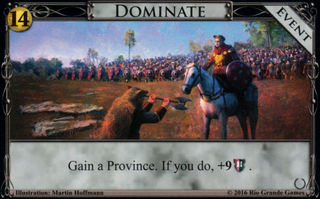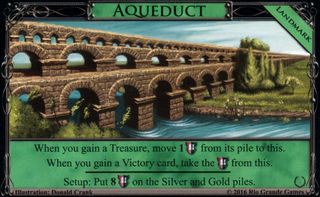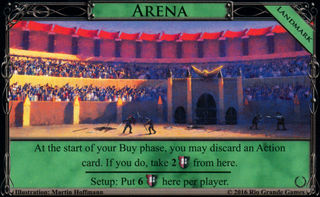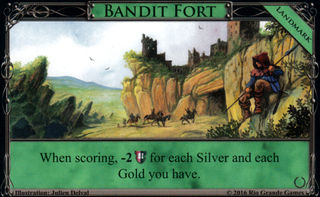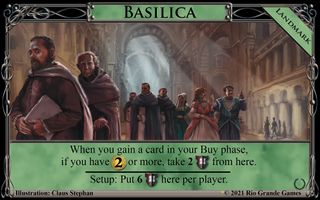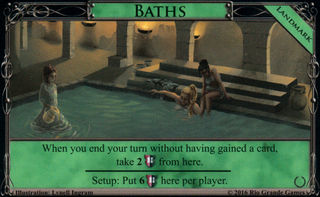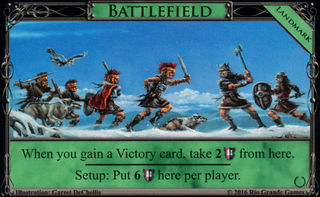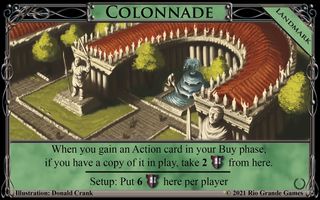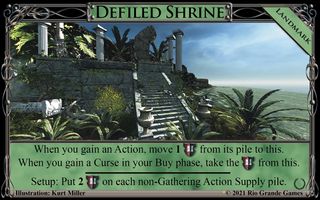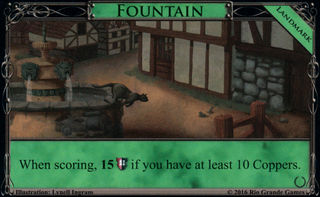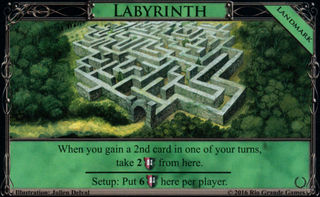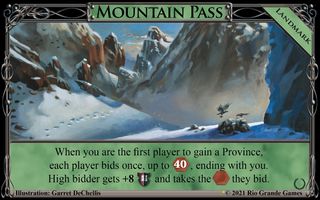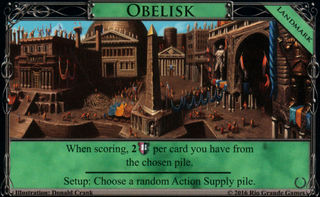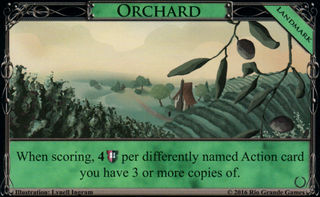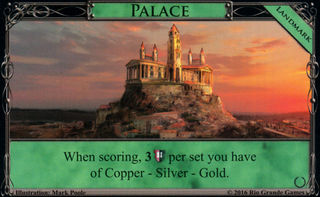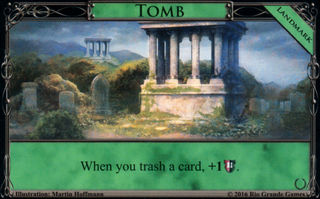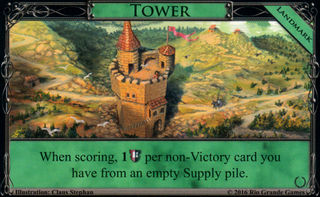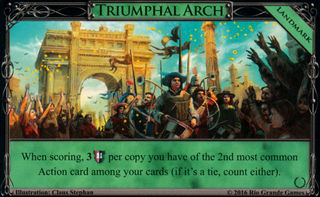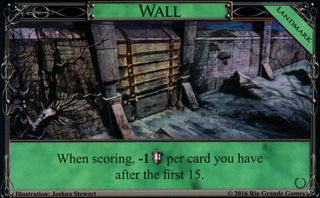Castle
| Castles | |
|---|---|
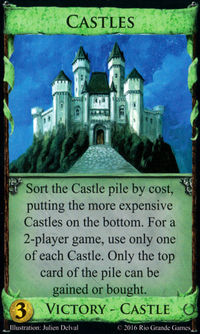 | |
| Info | |
| Cost | |
| Type(s) | Victory - Castle |
| Kingdom card? | Yes |
| Set |
Empires |
| Illustrator(s) | Julien Delval |
| Card text | |
| Sort the Castle pile by cost, putting the more expensive Castles on the bottom. For a 2-player game, use only one of each Castle. Only the top card of the pile can be gained or bought. | |
Castle is a type of Kingdom card from Empires. It is a Split pile with 8 differently-named unique Castles; when Castles are selected as a Kingdom card for a game, they are ordered in ascending order of cost from to in a single Supply pile, of which only the top card can be gained at any given time, though you may look through the pile to see which Castles are next.
Every Castle is a Victory–Castle card, though 3 have an additional type as well. They are all worth some amount of ![]() (and are thus considered alt-VP), and most have different abilities as well.
(and are thus considered alt-VP), and most have different abilities as well.
In games with more than 2 players, an extra copy of 4 of the Castles (Humble, Small, Opulent, King’s) are added to the pile, still in ascending order of cost.
Contents |
List of Castles
- Humble Castle
- Crumbling Castle
- Small Castle
- Haunted Castle
- Opulent Castle
- Sprawling Castle
- Grand Castle
- King's Castle
Image Gallery
FAQ
See individual Castle pages.
Strategy
Note: This section is written to specifically address the setup for two-player games, but the general concepts still apply to multiplayer.
The Castles pile consists of alt-VP cards with variable names, prices, and other properties. If uncontested, acquiring the complete set of 8 Castle cards is worth at least 45 ![]() , which rivals the 48
, which rivals the 48 ![]() value of the entire 2-player stack of Provinces:
value of the entire 2-player stack of Provinces:
- Humble Castle: 1
 for each castle = 8
for each castle = 8 
- Crumbling Castle: 1
 , plus an extra
, plus an extra  for gaining = 2
for gaining = 2 
- Small Castle: 2

- Haunted Castle: 2

- Opulent Castle: 3

- Sprawling Castle: 4
 + a free Duchy = 7
+ a free Duchy = 7 
- Grand Castle: at least 5

- King's Castle: 2
 for each castle = 16
for each castle = 16 
In practice, the pile is likely to be contested. The presence of so much additional ![]() in the Kingdom tends to prolong the game and provide more time and payoff for building a good engine that can take many green cards per turn. Because most of the Castles are not very useful as playable cards, they are often gained towards the endgame, like other Victory cards; however, because several of them do have other functions and certain Castles may be more desirable than others, there is sometimes pressure to start gaining them slightly earlier.
in the Kingdom tends to prolong the game and provide more time and payoff for building a good engine that can take many green cards per turn. Because most of the Castles are not very useful as playable cards, they are often gained towards the endgame, like other Victory cards; however, because several of them do have other functions and certain Castles may be more desirable than others, there is sometimes pressure to start gaining them slightly earlier.
The variable nature and increasing costs of Castles have several ramifications that differentiate them from uniform piles of Victory cards:
- First, effective scoring with Castles is largely tied to King's Castle and, to a lesser extent, Humble Castle, which both scale with the number of Castles you have. As such, you’ll usually have to commit to scoring via Castles, and won’t get much
 from only one or two copies as you would with Provinces, even if those are the pricier Castles. It also means that if your opponent is going for Castles, you will need to periodically weigh up how much
from only one or two copies as you would with Provinces, even if those are the pricier Castles. It also means that if your opponent is going for Castles, you will need to periodically weigh up how much  you can deny your opponent by taking a Castle for yourself.
you can deny your opponent by taking a Castle for yourself.
- Second, the varying costs of Castles mean that you are often rewarded for building to have both additional gains via gainers or sources of +Buy (to acquire multiple cheaper Castles at once) and the ability to hit high pricepoints (to afford the more expensive Castles). In Kingdoms without those additional gains, you’ll likely have to start buying Castles earlier, as buying them later is likely to waste . Additionally, you’ll need to be aware of uncovering particular Castles for your opponent; for example, if you buy Small Castle, your opponent may then be able to attack you by buying Haunted Castle.
- Third, the greening process can be significantly smoother (and might therefore start earlier) or your scoring more potent with effects that appreciate the variety of Castles. Notably, deck control is much easier to maintain with Castles than with Provinces when you’re drawing with Menagerie; Bounty Hunter also has many more opportunities to generate . Similarly, Castles tend to synergize well with Displace, since they make many differently named cards available, and can be Displaced into more expensive Castles or Provinces. The fact that Castles each have a unique name also means that they provide extra
 with effects such as Fairgrounds and Museum but incur a significant
with effects such as Fairgrounds and Museum but incur a significant  penalty with Wolf Den.
penalty with Wolf Den.
Another somewhat significant difference between Castles and Provinces is that emptying the Castles pile is not solely sufficient to end the game. If you’ve emptied the Castles pile, you’ll likely need to find a way to end the game another way, probably by taking Provinces. This feature also means that milling Castles isn’t very effective, as it doesn’t bring the end of the game nearer and you would rather keep those cards to increase your own ![]() .
.
Since all the Castles have different abilities, there is also some strategy around targeting specific ones that are especially powerful or important to you in a particular game, and it’s important to consider the effects of leaving an opponent the opportunity to gain the next one (or multiple subsequent ones). The relevant considerations vary greatly depending on the Kingdom, but in general:
- Humble Castle is functionally equivalent to a Copper that comes with a small amount of
 unless you have many other Castles. This means it is usually a weak card, especially in the opening where it has a high opportunity cost. Typically, timing when to gain Humble Castle will depend on a mix of whether you have additional gains, your deck’s readiness to green, and its opportunity cost this turn. Humble Castle can be more attractive with a few effects: for example, if Keep is present, it is worth an additional 5
unless you have many other Castles. This means it is usually a weak card, especially in the opening where it has a high opportunity cost. Typically, timing when to gain Humble Castle will depend on a mix of whether you have additional gains, your deck’s readiness to green, and its opportunity cost this turn. Humble Castle can be more attractive with a few effects: for example, if Keep is present, it is worth an additional 5  .
.
- Crumbling Castle comes with a Silver. Gaining two stop cards early in the game greatly hinders your deck control, so an early Crumbling Castle is therefore most beneficial if you can both draw and benefit from the added payload. It might also be risky to uncover Small Castle, potentially leaving it to your opponent, if you lack the ability to gain that on the same turn too. Crumbling Castle is often a particularly good target for Small Castle’s effect, and by the time you’re in a position to use this, you may be able to make better use of the additional Silver that Crumbling Castle provides on being trashed.
- Small Castle allows you to trash a Castle to gain a more expensive Castle. This is usually useful, especially if you can trash a weak Castle (i.e. Crumbling Castle) or one whose primary appeal lies in its on-gain effect (usually Haunted Castle); however, if no better targets are available in hand, trashing Small Castle itself still tends to be worthwhile as it usually generates a net increase in the amount of
 you’re scoring with Castles. It may be worth retaining Small Castle for better control of the very expensive Castles if hitting those pricepoints is otherwise difficult.
you’re scoring with Castles. It may be worth retaining Small Castle for better control of the very expensive Castles if hitting those pricepoints is otherwise difficult.
- Haunted Castle has an on-gain handsize attack that is powerful and good at causing duds, so it can be a bad idea to uncover this Castle for an opponent. The Gold gaining is also often a useful boost to your payload by the time this Castle is available.
- Opulent Castle also offers a benefit beyond
 . It is most valuable if you are well into the greening phase (and therefore have plenty of Victory cards to discard), have very strong draw that enables you to make consistent use of it, and have enough +Buy to put it to use.
. It is most valuable if you are well into the greening phase (and therefore have plenty of Victory cards to discard), have very strong draw that enables you to make consistent use of it, and have enough +Buy to put it to use.
- Sprawling Castle can often be rather undesirable because it mandatorily adds additional, relatively low-value Victory cards to your deck. This is less of a problem if you anticipate the game ending very soon or need the extra
 , and may in some cases even be useful such as if you’re using Shepherd for draw.
, and may in some cases even be useful such as if you’re using Shepherd for draw.
- Grand Castle is variable in its
 value, and deciding whether or not to gain it is often situation-dependent. While it has a good chance of being worth significantly more
value, and deciding whether or not to gain it is often situation-dependent. While it has a good chance of being worth significantly more  than a Province as you’re well into the greening phase, you may alternatively be in a position to claim relatively few on-gain
than a Province as you’re well into the greening phase, you may alternatively be in a position to claim relatively few on-gain  and, more importantly, taking it without also being able to take King's Castle gives your opponent a shot at the latter. You need a significant amount of draw to fully profit from gaining Grand Castle because you need both enough payload to afford the Castle and multiple Victory cards in hand to get extra
and, more importantly, taking it without also being able to take King's Castle gives your opponent a shot at the latter. You need a significant amount of draw to fully profit from gaining Grand Castle because you need both enough payload to afford the Castle and multiple Victory cards in hand to get extra  ; this can be a particular problem if you’re using Opulent Castle for payload and don’t have overdraw to draw the Victory cards back up.
; this can be a particular problem if you’re using Opulent Castle for payload and don’t have overdraw to draw the Victory cards back up.
- Finally, King's Castle provides a significant
 swing depending on how many Castles each player has. Gaining it is likely to be very important; even if you have very few Castles yourself, this probably means that denying it to your opponent is crucial.
swing depending on how many Castles each player has. Gaining it is likely to be very important; even if you have very few Castles yourself, this probably means that denying it to your opponent is crucial.
External strategy articles
Note: Article(s) below are by individual authors and may not represent the community's current views on cards, but may provide more in-depth information or give historical perspective. Caveat emptor.
Versions
English versions
Other language versions
Trivia
Preview
Secret History
